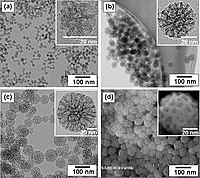
Photo from wikipedia
Newcastle disease (ND) and Avian influenza (AI) are the major problems and the most economically important viral diseases in the poultry industry; therefore, vaccination against these diseases is considered one… Click to show full abstract
Newcastle disease (ND) and Avian influenza (AI) are the major problems and the most economically important viral diseases in the poultry industry; therefore, vaccination against these diseases is considered one of the most effective ways of prevention. Extensive studies have been conducted to improve the performance of vaccines, and one of the major achievements of these studies is the preparation of adjuvants as stimulants of the immune system and one of the most important compounds in killed vaccines. An immunogenicity comparison of three adjuvants including, ISA70VG, Nano-Aluminum Hydroxide (Nano-Alum), and MF59 alone or with Nano-Selenium (Nano-Se), was performed using bivalent Newcastle plus Avian Influenza (ND+AI) killed vaccine. In this study, 105 specific-pathogen-free chicks (Ross-308) were divided into 7 treatments, including T1 (control group), T2 (ISA70VG), T3 (ISA70VG plus Nano-Se), T4 (Nano-Alum Hydroxide), T5 (Nano-Alum+Nano-Se), T6 (MF59), and T7 (MF59+Nano-Se). The vaccine was injected subcutaneously on day 21 in the back of the neck area. The blood samples were taken on days 14, 21, 28, 35, 42, and 49 post-vaccination. Serums of the samples were titrated by the haemagglutination inhibition (HI) test against Newcastle and Avian influenza. Based on the results, the highest HI test titers were observed for the T2 and T3 treatments, while the T6 and T7 treatments had the lowest titers. Moreover, regardless of the type of the adjuvants, adding Nano-Se increased the antibody titer in the vaccinated groups. In conclusion, a combination of the ISA70VG adjuvant and Nano-Se induced excellent antibody titers using bivalent ND+AI killed vaccine.
Journal Title: Archives of Razi Institute
Year Published: 2021
Link to full text (if available)
Share on Social Media: Sign Up to like & get
recommendations!